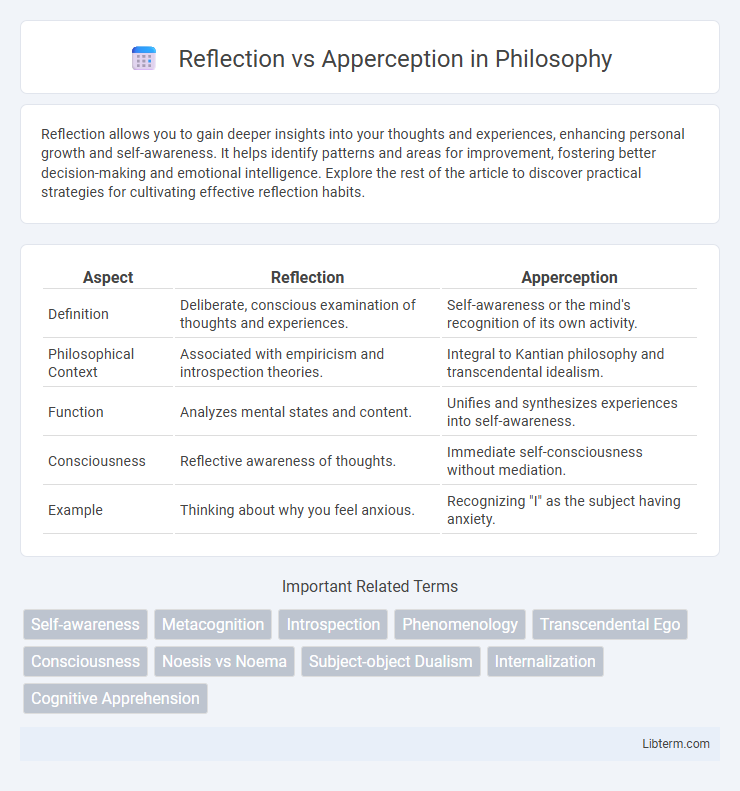Reflection allows you to gain deeper insights into your thoughts and experiences, enhancing personal growth and self-awareness. It helps identify patterns and areas for improvement, fostering better decision-making and emotional intelligence. Explore the rest of the article to discover practical strategies for cultivating effective reflection habits.
Table of Comparison
| Aspect | Reflection | Apperception |
|---|---|---|
| Definition | Deliberate, conscious examination of thoughts and experiences. | Self-awareness or the mind's recognition of its own activity. |
| Philosophical Context | Associated with empiricism and introspection theories. | Integral to Kantian philosophy and transcendental idealism. |
| Function | Analyzes mental states and content. | Unifies and synthesizes experiences into self-awareness. |
| Consciousness | Reflective awareness of thoughts. | Immediate self-consciousness without mediation. |
| Example | Thinking about why you feel anxious. | Recognizing "I" as the subject having anxiety. |
Introduction to Reflection and Apperception
Reflection involves the conscious examination of one's own thoughts and experiences, enabling self-awareness and critical thinking. Apperception extends beyond reflection by integrating new information with existing cognitive frameworks, facilitating deeper understanding and personal development. Both processes are fundamental in cognitive psychology for analyzing how individuals process and internalize knowledge.
Defining Reflection: Meaning and Contexts
Reflection involves the deliberate process of examining one's thoughts, feelings, and experiences to gain deeper understanding and insight. It occurs in various contexts such as education, psychology, and philosophy, where individuals analyze their mental processes to enhance self-awareness and learning. Reflection contrasts with apperception by emphasizing conscious contemplation rather than the immediate integration of new sensory information with existing knowledge.
What is Apperception? Key Concepts
Apperception is the cognitive process by which new experiences are assimilated and interpreted through the lens of existing knowledge and self-awareness. Key concepts include the integration of sensory input with prior understanding, enabling conscious reflection and meaningful insight. Unlike mere reflection, apperception involves active mental synthesis that shapes perception and informs decision-making.
Historical Perspectives on Reflection and Apperception
Historical perspectives on reflection emphasize its role in self-examination and conscious thought, tracing back to Descartes' cogito philosophy, which highlighted reflection as the foundation of self-awareness. Apperception, rooted in Kantian and Leibnizian traditions, focuses on the mind's active synthesis of sensory data into coherent experience, underscoring the dynamic nature of consciousness. Early philosophical debates distinguished reflection as passive mental review, while apperception involved an integrative, higher-order awareness crucial to cognitive development theories.
Psychological Foundations of Reflection
Reflection involves the mental process of examining one's own thoughts and experiences, enabling self-awareness and critical thinking, which are foundational in cognitive psychology. Apperception refers to the integration of new sensory information with existing knowledge, emphasizing how prior experiences shape perception and understanding. Psychological foundations of reflection center on metacognition and self-regulation, crucial for problem-solving, learning, and emotional intelligence development.
Apperception in Cognitive Development
Apperception in cognitive development involves the active process of interpreting new experiences by integrating them with existing knowledge, enhancing self-awareness and understanding. This dynamic mental function enables learners to connect past experiences with current information, facilitating deeper comprehension and adaptive thinking. Unlike passive reflection, apperception drives cognitive growth by transforming sensory input into meaningful insights through conscious interpretation.
Differences Between Reflection and Apperception
Reflection involves the passive observation and consideration of sensory experiences or thoughts, whereas apperception actively integrates these experiences into a coherent understanding of the self. Reflection is generally a slower, more deliberate process of reviewing past experiences, while apperception occurs as an immediate synthesis, shaping conscious awareness. The key difference lies in apperception's role in organizing and giving meaning to perceptions, making them part of an ongoing, unified mental framework.
Practical Applications in Education and Self-Understanding
Reflection enhances self-awareness by encouraging students to analyze their learning experiences, leading to improved critical thinking and problem-solving skills. Apperception integrates new knowledge with prior understanding, facilitating deeper comprehension and personalized learning pathways. Educators use reflection to foster metacognitive skills, while apperception supports adapting teaching methods to individual cognitive frameworks, promoting effective self-understanding and lifelong learning.
Reflection vs Apperception: Real-Life Examples
Reflection involves passive mental processes where information is recalled or considered without altering its content, such as remembering a past conversation. Apperception requires active interpretation and integration of new experiences with existing knowledge, like understanding a complex concept by relating it to prior learning. In real life, reflection might be a student reviewing notes, whereas apperception is the student's ability to apply those notes creatively during problem-solving.
Conclusion: Integrating Reflection and Apperception for Growth
Integrating reflection and apperception fosters deeper self-awareness by combining critical analysis of past experiences with the active interpretation of new sensory information. This synthesis enhances personal growth, as reflection alone risks stagnation while apperception without reflection can lead to superficial understanding. Together, they create a dynamic process that promotes continuous learning and adaptive development.
Reflection Infographic

 libterm.com
libterm.com